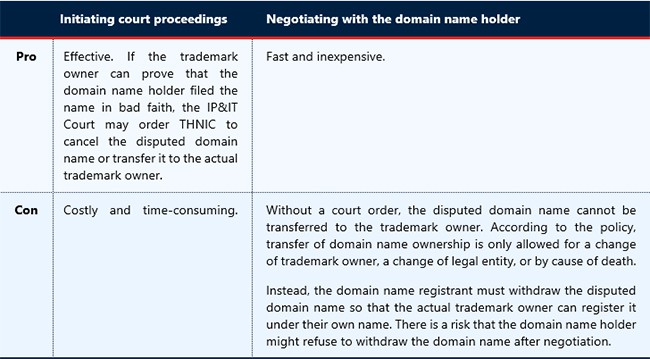
Background
In Thailand, bad-faith domain name registrations can present a unique challenge to brand owners.
According to the current domain registration policy, Thai domain names can be based on the registered name of a company or organization, or on a registered trademark, depending on the domain name category. When Thailand’s domain name registrar, the Thai Network Information Centre Foundation (THNIC), considers applications for new domain names, it examines only whether the applicant meets these criteria – and not whether the application has been led in bad faith, such as when a registered company uses someone else’s registered trademark without authorization.
Domain name registration in Thailand is a first-to-file system, so if all criteria are met, THNIC must allow registration. There are no opposition or cancellation proceedings, making it impossible for an interested person, as well as THNIC itself, to invalidate a Thai-registered domain name.
Disputes between two legitimate owners
Disputes sometimes arise between trademark owners and Thai-registered companies, such as third-party companies, local distributors, or even authorized trademark licensees who exploit the policy gap identified above.
For instance, in a recent case a brand owner found that its Thailand distributor had been able to register a company name containing its registered trademark, and subsequently register such name as a domain name, without the trademark owner’s consent. Fortunately, the two parties had a strong existing business relationship as supplier and distributor; through amicable negotiation, the local distributor agreed to withdraw the disputed domain name. However, if both parties had insisted on their legitimate rights over the disputed name, the case would have had to proceed to court, as THNIC does not get involved in such disputes and offers no dispute resolution mechanisms.
Navigating the options
Trademark owners facing such a dispute have two options: initiating proceedings with the Intellectual Property and International Trade Court (IP & IT Court) or negotiating with the domain name holder. The pros and cons of each solution are identified below:

Of course, the best course of action for brand owners is to take proactive steps that minimize the risk of falling victim to a bad-faith domain name registration in Thailand. One way to do this is by reviewing trademark portfolios, selecting highly important registered trademarks, and registering and maintaining those as domain names to prevent unauthorized parties from registering the names. Another way to guard against bad-faith actions is simply by staying vigilant. Many companies have their trademarks actively monitored to detect unauthorized activity. Expanding this to also cover domain names can alert the brand owner to potential problems before they become serious threats.
Comment
Regulatory laws and gaps can be very frustrating—and damaging—to businesses, but knowing the law and understanding its potential pitfalls can help companies deal strategically with the challenges.

